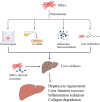Mesenchymal stromal cells: promising treatment for liver cirrhosis
- PMID: 35841079
- PMCID: PMC9284869
- DOI: 10.1186/s13287-022-03001-z
Mesenchymal stromal cells: promising treatment for liver cirrhosis
Abstract
Liver fibrosis is a wound-healing process that occurs in response to severe injuries and is hallmarked by the excessive accumulation of extracellular matrix or scar tissues within the liver. Liver fibrosis can be either acute or chronic and is induced by a variety of hepatotoxic causes, including lipid deposition, drugs, viruses, and autoimmune reactions. In advanced fibrosis, liver cirrhosis develops, a condition for which there is no successful therapy other than liver transplantation. Although liver transplantation is still a viable option, numerous limitations limit its application, including a lack of donor organs, immune rejection, and postoperative complications. As a result, there is an immediate need for a different kind of therapeutic approach. Recent research has shown that the administration of mesenchymal stromal cells (MSCs) is an attractive treatment modality for repairing liver injury and enhancing liver regeneration. This is accomplished through the cell migration into liver sites, immunoregulation, hepatogenic differentiation, as well as paracrine mechanisms. MSCs can also release a huge variety of molecules into the extracellular environment. These molecules, which include extracellular vesicles, lipids, free nucleic acids, and soluble proteins, exert crucial roles in repairing damaged tissue. In this review, we summarize the characteristics of MSCs, representative clinical study data, and the potential mechanisms of MSCs-based strategies for attenuating liver cirrhosis. Additionally, we examine the processes that are involved in the MSCs-dependent modulation of the immune milieu in liver cirrhosis. As a result, our findings lend credence to the concept of developing a cell therapy treatment for liver cirrhosis that is premised on MSCs. MSCs can be used as a candidate therapeutic agent to lengthen the survival duration of patients with liver cirrhosis or possibly reverse the condition in the near future.
Keywords: Exosome; Immunomodulatory effects; Liver cirrhosis; Mesenchymal stromal cells; Paracrine effects; Trans-differentiation.
© 2022. The Author(s).
Conflict of interest statement
The authors declare that they have no competing interests.
Figures



References
Publication types
MeSH terms
LinkOut - more resources
Full Text Sources
Research Materials

